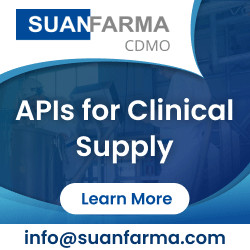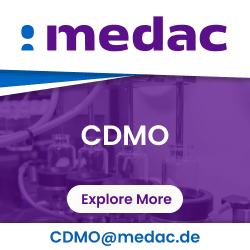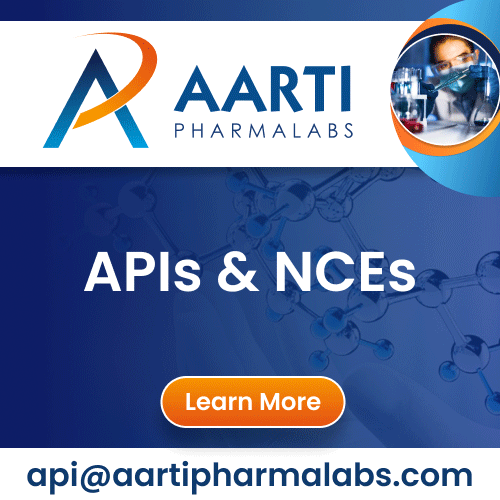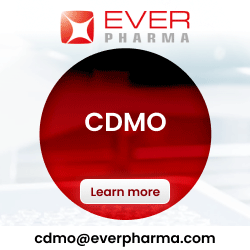BLOG
MARKET INTEL by PharmaCompass
CONTENT by Suppliers
- Interview #SpeakPharma
- Video #SupplierSpotlight
- Vlog #PharmaReel
- Company Bio #AboutSupplier
- Service Bio #AboutCapabilities
News
Create content with us, ask us


- CONTRACT MANUFACTURING
- CYTOTOXIC COMPOUND
- ANTIBIOTIC
- ANTIBODY DRUG CONJUGATE
- BIOLOGICS, BIOPROCESS & FERMENTATION
- CHIRAL SYNTHESIS
- CLINICAL SUPPLY
- CONTINUOUS FLOW PROCESS
- CONTROLLED SUBSTANCE
- CUSTOM SYNTHESIS & MANUFACTURING
- DISTILLATION / LIQUID API
- DRYING
- FINE CHEMICAL / INTERMEDIATE
- GMP MANUFACTURING
- HALOGENATION
- HAZARDOUS CHEMISTRY
- HIGH POTENCY APIS (HPAPIS)
- HIGH PRESSURE REACTION (> 100 PSI)
- HIGH TEMPERATURE REACTION (> 200 °C)
- HYDROGENATION
- LOW TEMPERATURE / CRYOGENIC CONDITIONS
- LYOPHILIZATION
- MICRONIZATION
- ORGANOMETALLIC CHEMISTRY
- OZONOLYSIS
- PHOSGENATION
- PLANT EXTRACTION
- PROBIOTIC
- PROCESS DEVELOPMENT & OPTIMIZATION
- PROCESS SAFETY ASSESSMENT
- PROTEIN / PEPTIDE
- REFERENCE STANDARD
- RESOLUTION OF RACEMIC MIXTURE
- SCALE UP
- SEPARATION & PURIFICATION
- SMALL SCALE BATCH
- INJECTABLE / STERILE APIS
- STEROID / HORMONE
- VITAMINS / MINERALS / INORGANIC SALTS
- CHROMATOGRAPHY
- OLIGOSACCHARIDES & POLYSACCHARIDES
- SMALL MOLECULES
- OLIGONUCLEOTIDE / POLYNUCLEOTIDE
- BIOPOLYMERS

01 Overview
02 Overview
03 Overview
04 Overview
05 Overview
06 Overview
07 Overview
08 Overview
09 Overview
10 Overview
11 Overview
12 Overview
13 Overview
14 Overview
15 Overview
16 Overview
17 Overview
18 Overview
19 Overview
20 Overview
21 Overview
22 Overview

01 AGC Pharma Chemicals Europe
02 Aarti Pharmalabs
03 Aesica Pharmaceuticals Limited
04 Angelini Pharma
05 Anhui Ribobay Pharmaceutical Co.,Ltd
06 Aspen API
07 Aurigene Pharmaceutical Services
08 Axplora
09 Bachem AG
10 CARBOGEN AMCIS AG
11 CSBio
12 Cohance Lifesciences
13 Cook Pharmica LLC.
14 Curia
15 DOTTIKON EXCLUSIVE SYNTHESIS AG
16 Dishman Carbogen Amcis
17 Diverchim
18 Egis Pharmaceuticals PLC
19 Eurofins CDMO
20 Evonik
21 Fareva
22 Farmhispania
23 Fermion Oy
24 Indena
25 Kimia Biosciences
26 Kinsy SL
27 Lupin Manufacturing Solutions
28 Magle Chemoswed
29 Maithili Life Sciences
30 Metrochem API Private Limited
31 Neuland Laboratories
32 Olon S.p.A
33 PI Health Sciences
34 PMC Isochem
35 Pfanstiehl
36 Pfizer CentreOne
37 Piramal Pharma Solutions
38 ScinoPharm Taiwan Ltd
39 Seqens
40 Servier
41 Shanghai Chemspec Corporation
42 Siegfried AG
43 Solara Active Pharma Sciences
44 Suanfarma
45 UQUIFA
46 V-Nano

01 China
02 Finland
03 France
04 France
05 France
06 Germany
07 Germany
08 Hungary
09 India
10 India
11 India
12 India
13 India
14 India
15 India
16 Italy
17 Luxembourg
18 Netherlands
19 Spain
20 Spain
21 Spain
22 Spain
23 Sweden
24 Switzerland
25 Switzerland
26 Switzerland
27 Taiwan
28 U.S.A
29 U.S.A
30 U.S.A
31 United Kingdom
- Analytical > Analytical Method Development
- Analytical > Analytical Testing Services > Inhalation Products
- Analytical > BioAnalytical Services
- API & Drug Product Development > API Development
- API & Drug Product Development > API Development > Antibody Drug Conjugate
- API & Drug Product Development > API Development > Fine Chemical / Intermediate
- API & Drug Product Development > API Development > High Potency APIs (HPAPIs)
- API & Drug Product Development > API Development > Impurity / Reference Standard
- API & Drug Product Development > API Development > Oligonucleotide / Polynucleotide
- API & Drug Product Development > API Development > Oligosaccharides & Polysaccharides
- API & Drug Product Development > API Development > Overview
- API & Drug Product Development > API Development > Process Development & Optimization
- API & Drug Product Development > API Development > Protein / Peptide
- API & Drug Product Development > API Development > Separation & Purification
- API & Drug Product Development > API Development > Small Molecules
- API & Drug Product Development > API Development > Spray Drying
- API & Drug Product Development > Formulation Development
- API & Drug Product Development > Formulation Development > Buccal / Orodispersible
- API & Drug Product Development > Formulation Development > Capsule
- API & Drug Product Development > Formulation Development > Chewable / Suckable
- API & Drug Product Development > Formulation Development > Clinical Supply
- API & Drug Product Development > Formulation Development > Compounding
- API & Drug Product Development > Formulation Development > Controlled / Immediate / Modified Release
- API & Drug Product Development > Formulation Development > Controlled Substance
- API & Drug Product Development > Formulation Development > Granule / Pellets
- API & Drug Product Development > Formulation Development > Inhalation / Nasal
- API & Drug Product Development > Formulation Development > Injectable / Parenteral
- API & Drug Product Development > Formulation Development > Liquid Formulation
- API & Drug Product Development > Formulation Development > Lyophilization
- API & Drug Product Development > Formulation Development > Ophthalmic
- API & Drug Product Development > Formulation Development > Pediatric Formulation
- API & Drug Product Development > Formulation Development > Scale-Up Capabilities
- API & Drug Product Development > Formulation Development > Sterile Liquid Formulation
- API & Drug Product Development > Formulation Development > Suspension
- API & Drug Product Development > Formulation Development > Tablet
- API & Drug Product Development > Formulation Development > Topical
- API & Drug Product Development > Preformulation & Material Science > Particle Size Reduction & Micronization
- API & Drug Product Development > Preformulation & Material Science > Polymorph & Crystal Screening
- API & Drug Product Development > Preformulation & Material Science > Solubility Assessment & Enhancement
- API & Drug Product Development > Preformulation & Material Science > Taste Masking
- API Manufacturing > Antibiotic
- API Manufacturing > Antibody Drug Conjugate
- API Manufacturing > Biologics, Bioprocess & Fermentation
- API Manufacturing > Chiral Synthesis
- API Manufacturing > Clinical Supply
- API Manufacturing > Continuous Flow Process
- API Manufacturing > Contract Manufacturing
- API Manufacturing > Controlled Substance
- API Manufacturing > Custom Synthesis & Manufacturing
- API Manufacturing > Cytotoxic Compound
- API Manufacturing > Drying > Spray Drying
- API Manufacturing > Fine Chemical / Intermediate
- API Manufacturing > GMP Manufacturing
- API Manufacturing > Hazardous Chemistry
- API Manufacturing > High Potency APIs (HPAPIs)
- API Manufacturing > Micronization
- API Manufacturing > Oligonucleotide / Polynucleotide
- API Manufacturing > Oligosaccharides & Polysaccharides
- API Manufacturing > Organometallic Chemistry
- API Manufacturing > Organometallic Chemistry > Cyanation
- API Manufacturing > Organometallic Chemistry > Metal Hydride Reduction
- API Manufacturing > Ozonolysis
- API Manufacturing > Process Development & Optimization
- API Manufacturing > Protein / Peptide > Synthesis
- API Manufacturing > Reference Standard
- API Manufacturing > Scale Up
- API Manufacturing > Separation & Purification
- API Manufacturing > Small Molecules
- Clinical Trials > Compliance, Regulatory & Consulting
- Clinical Trials > Packaging & Logistics
- Clinical Trials > Medical Writing & Language Translation
- Clinical Trials > Patient / Investigator Recruitment
- Clinical Trials > Technology / Data / Analytics
- Drug Product Manufacturing > Biologic Drugs
- Drug Product Manufacturing > Capsule
- Drug Product Manufacturing > Capsule > Steroid / Hormone
- Drug Product Manufacturing > Compounding
- Drug Product Manufacturing > Cream / Lotion / Ointment
- Drug Product Manufacturing > Emulsion > Overview
- Drug Product Manufacturing > Gel > Overview
- Drug Product Manufacturing > Granule / Pellet
- Drug Product Manufacturing > Injectable / Parenteral
- Drug Product Manufacturing > Injectable / Parenteral > Overview
- Drug Product Manufacturing > Injectable / Parenteral > Pre-Filled Syringe
- Drug Product Manufacturing > Liquid
- Drug Product Manufacturing > Lyophilization
- Drug Product Manufacturing > Nasal
- Drug Product Manufacturing > Softgel Capsule
- Drug Product Manufacturing > Solution > Overview
- Drug Product Manufacturing > Spray
- Drug Product Manufacturing > Suppository
- Drug Product Manufacturing > Suspension > Overview
- Drug Product Manufacturing > Syrup
- Drug Product Manufacturing > Tablet
- Drug Product Manufacturing > Technologies
- Drug Product Manufacturing > Technologies > Orally Disintegrating Tablets (ODTs)
- Drug Product Manufacturing > Technologies > Taste Masking
- Packaging > Clinical Services
- Packaging > Contract Services
- Packaging > Contract Services > Serialization Compliance
- Packaging > Logistic Services
- Empty Capsules
- Empty Capsules > Clinical Supply
- Empty Capsules > HardGel
- Empty Capsules > Inhalation
- Emulsifying Agents
- Soft Gelatin
- Solubilizers
Overview of clinical supplies of APIs & intermediates & more on clinical supply manufacturers (CDMO, CMO) offering clinical services.
Q1. What is API clinical supply?
API clinical supply, or API clinical trial supply, is defined as the supply of Active Pharmaceutical Ingredients (APIs) required for clinical trials. The core of any good clinical supply chain system is supply management that addresses all of the nuances of clinical supplies production.
Clinical supply, or clinical trial supply includes 24-hour collection and delivery of biological specimens, investigational drugs, kits and other study materials such as APIs and Finished Dosage Forms (FDFs) along with cold chain services including temperature-controlled packaging, etc.
Clinical supplies (CS) can be a rate-limiting factor for the initiation of studies because of factors such as insufficient bulk material, inadequate forecasted demand, accumulation of delays (such as pharmaceutical manufacturing delays), or a sudden acceleration in the timeline for the study's start.
Compared to their commercial counterparts more advanced in the maturity curve, clinical supply chains face greater challenges from both demand and API supply perspectives. Furthermore, unpredictable patient enrollment leads to fluctuating demand signals, frequently causing supply disruptions.
Various pharmaceutical organizations including CDMOs (Contract Development and Manufacturing Organizations) which offer API manufacturing or API production and have clinical manufacturing capabilities can offer API clinical supply manufacturing and packaging services along with commercial cGMP manufacturing of APIs.
To ensure successful manufacturing of Active Pharmaceutical Ingredients (APIs) during clinical trials, it pays to work with a Contract Development and Manufacturing Organization (CDMO) or a Contract Research and Manufacturing Services (CRAMS) provider with deep expertise and experience in clinical trial molecules or APIs.
Such organizations can offer integrated API clinical trial material development and manufacturing services. The CDMO should uphold the highest current Good Manufacturing Practices (cGMP) to avoid cross-contamination or other factors that could impact the quality of the clinical trial supplies.
However, contracting with a Clinical Research Organization (CRO), CRAMS or Clinical Manufacturing Organization (CMO) may be more efficient for offering integrated API clinical trial material development and manufacturing services. They can take sponsors through every step of the way in the lengthy drug development process all the way through manufacturing and may have a strong record of getting required clinical trial materials ready in time for the launch of clinical trials.
Q2. What are the different API CDMO services from process development to clinical supply and commercial manufacturing?
Planning and managing clinical trials is an increasingly complex task. Unlike standard pharmaceutical supply chains, there are many unpredictable factors. Some key API CDMO services engaged with clinical trial supplies activities include: process development, API manufacturing, clinical supply manufacturing and packaging services, among others.
- Phase Familiarization
Phase familiarization is the first step which includes running experiments, spending several weeks or even months either replicating existing work or developing new chemistry routes to attain the final molecule.
- Process Development
During the development phase of API clinical supply, pharmaceutical companies are challenged with choosing a manufacturing process that ensures that APIs will reach clinical studies quickly and that they can be made using a cost-effective process.
To meet the demands of early-stage development, contract research organizations (CROs) and CDMOs can evaluate various dosage-form options and manufacturing pathways before selecting the processes that optimize the clinical manufacturing process. R&D and kilo labs support process development and sample preparation for drug substances including complex APIs for early stage clinical trials.
- API Manufacturing for Clinical Supply
API manufacturing for clinical supplies changes with demand, availability of drug substances, and study phases. A strategy must be developed clearly to effectively manage the complex clinical supplies manufacturing process. The process may begin with the manufacturing of R&D or scale-up batches of APIs followed by GMP clinical supplies manufacturing.
Furthermore, API clinical manufacturing includes planning, collaborative communication among the cross-functional team, lean manufacturing, effective training programs, and application of new specialized technologies to facilitate clinical supplies manufacturing or clinical supplies production.
- Scale Up & Technology Transfer
Next come scale up and technology transfer API CDMO services which are essential for successful API clinical supply. The development of pharmaceutical products from laboratory scale to large-scale industrial production involves numerous planning steps which includes scale-up at different levels.
The goal of scale-up is to identify and develop a process that will successfully produce a desired product when manufactured at a commercial scale. Technology transfer is what happens when a pharmaceutical company wants to change from an existing manufacturing site to a new manufacturing site or when they move from manufacturing APIs from one scale to the next.
- Clinical Trial Packaging
Highly specialized activities are needed for clinical trial packaging and distributing clinical trial supplies which are to be dispensed to patients in a timely and controlled manner.
These highly specialized activities include project management, randomization generation, clinical trial material labeling, blinding, pharmaceutical supply chain logistics, and destruction. Effective clinical trial packaging, clinical trial material labeling, etc. can make the difference between a successful clinical trial and a failed clinical trial.
Commercial Manufacturing & Supply
Once a viable active pharmaceutical ingredient (API) has been developed, and clinical trials have delivered promising results, scale up is carried out to produce commercial-scale batches of the drug substance at a larger scale, the commercial scale.
Commercial manufacturing involves commercial cGMP manufacturing of APIs at a production scale to facilitate the commercial supply of pharmaceuticals to the industry. After a large enough quantity of the product is produced it is ready for commercial supply.
Q3. What are the important things to know about API development and manufacturing for phase 1 & 2 clinical trials?
Clinical trials have a vigorous pharmaceutical supply chain management of drug products and drug substances considering the stringency of the regulations and the availability of infrastructure for efficient execution.
Drug manufacturers have begun to outsource their logistics and material supply requirements along with integrated full-services to third parties for efficient functioning of clinical trials. This has integrated the third-party vendors into clinical trial development and clinical supply chain management.
The new drug development process can be characterized into different clinical phases including phases I, II, III, and IV. From phase I to phase III, clinical investigation is one of the most important activities to prove the safety and efficacy of a new drug.
More specifically, phase I studies use clinical trial materials and supplies to test the safety of drug products, while phase II studies utilize clinical trial materials and supplies to test the efficacy of drug products.
API Development and Manufacturing For Phase 1 & 2 Clinical Trials:
Phase 1:
Phase 1 clinical trials represent the first phase in a long and complex drug development process. It is during this stage that a specific drug product's safety, efficacy and effects are benchmarked and determined. A phase 1 clinical trial introduces an investigational new drug into human subjects for the first time. For this reason, this phase is perhaps the most vital and challenging one for sponsors and their CDMOs alike.
Some pharmaceutical companies may choose to outsource phase I development of clinical supplies and API clinical trial material manufacturing services to CDMOs (Contract Development and Manufacturing Organizations). When choosing a CDMO it is important to use a single organization for the entire project, check if they have ample supply to meet your requirements, beware of low estimates, etc.
Phase 2:
When preparing for phase 2 clinical trial programs, one of the biggest challenges is scaling up to produce significantly more Active Pharmaceutical Ingredient (API) material than the amount needed for phase 1. Because phase 2 clinical trials are larger, with more participants, materials need to be scaled.
Important factors to consider include reviewing the chemistry before manufacturing at a large scale, making small engineering batches prior to manufacturing, and conducting analytical assessments, etc. Process research, kilo lab scaleup and analytical development are key to smooth transitions from phase 1 to phase 2, and for the preparation of phase 3 trials.
Various pharmaceutical organizations with API development and manufacturing capabilities may offer clinical development services for phase 1 and phase 2 clinical trials along with API clinical trial material manufacturing services and commercial cGMP manufacturing of APIs.
Q4. How does complexity impact the timeline, process and cost of turning a molecule into a drug for clinical trials?
Successful supply of clinical materials is key to assure that clinical studies are conducted as planned at the correct time with the correct dose and correct amount of materials. However, complexity impacts the timeline, process and cost of turning a molecule into a drug for clinical trials.
- Process
The process of complex drug discovery and development is long and expensive as many biological targets must be considered for every new medicine eventually approved for clinical use. Furthermore, new research tools may be needed to investigate each new target.
- Timeline
There are typically several chemical steps needed to make complex material for clinical trials. Even if one step has poor yield it can cause a huge setback in terms of time for pharmaceutical organizations. There never seems to be enough time, especially when it comes to developing an NCE.
True collaboration with a CDMO (Contract Development and Manufacturing Organization), CRO (Clinical Research Organization) or CMO (Contract Manufacturing Organization) can destress the process of preparing a drug for clinical trials.
- Cost
Complex studies present unique cost considerations. With such a large financial burden, many trials are underfunded, and may not have any reasonable opportunity to generate a positive outcome even if protocols are amended, at additional cost. Underfunded trials are by definition more likely to miss the enrollment needed to demonstrate statistical significance at a predefined level of efficacy.
Studies that contribute to solving any of the many scientific and operational issues involved in the clinical development process can improve the efficiency of the process. An awareness of these issues allows the early implementation of measures to increase the opportunity for success.
Working with CDMOs (Contract Development and Manufacturing Organizations) which function as API suppliers or API manufacturers allows partnering pharmaceutical companies to benefit from a long-term collaboration with an experienced team offering specific skills, equipment and technical resources that are not available internally, resulting in a robust clinical API supply chain, reduced risks and optimized costs for integrated API clinical trial material development and manufacturing services.
Q5. Which are the leading pharmaceutical companies offering clinical manufacturing for APIs?
Pharmaceutical innovators are today relying more on integrated full-service CDMOs (Contract Development and Manufacturing Organization) for the clinical and commercial production of their API (active pharmaceutical ingredient) and for API clinical trial material manufacturing services.
Solara Active Pharma Sciences - Clinical Supply Manufacturer
Solara offers API contract manufacturing for clinical supply - phase I, II and III trials and functions as a clinical supply manufacturer. They cover the entire life cycle of a new chemical entity at all scales, from pre-clinical and clinical phases. They have specialized technologies to offer chemistry services, which include lead synthesis, lead optimization and pre-clinical services.
Solara's CRAMS business also offer contract services for pharmaceutical products in phase I, II and III, which require process optimization and cGMP production. Further, it has the capabilities to assist customers in the commercialization phase of their products. Its contract manufacturing services and outsourcing services are primarily directed towards pharmaceutical manufacturing of complex APIs and intermediates.
PMC Isochem - Clinical Supply Manufacturer for Clinical Trial Services
PMC Isochem offers cGMP and non cGMP industrial exclusive custom synthesis and provides integrated full-services from pharmaceutical drug development to API production including clinical batch supply, clinical supply chain solutions and regulatory support. PMC Isochem's clinical offerings make them a partner of choice as a clinical supply manufacturer.
PMC functions as a CDMO for intermediates , excipients and API production and has 40 years of experience in custom manufacturing from R&D to clinical trial services and commercial supply. PMC Isochem offers research, product / process development, preclinical and clinical batches and commercial supply along with the development of APIs and Intermediates for major pharmaceutical companies worldwide.
Pfizer CentreOne - Small Clinical Batch Manufacturing
Pfizer CentreOne offers clinical and commercial production and can help take your molecule all the way from early clinical phases through to commercial scale production and lifecycle management. Its clinical trial services offerings include APIs and formulations, clinical manufacturing, analytical testing, validation and method development.
Pfizer CentreOne offers the development of APIs and Intermediates and manufacturing flexibility to support small clinical and commercial scale batches with their cGMP pilot facilities. It is a leading clinical supply manufacturer in the pharmaceutical industry.
Bachem AG - Peptide and Small Molecules APIs
Bachem is the world's leading independent manufacturer of peptide and small molecules APIs. Each year, Bachem manufactures hundreds of batches of drug substances for projects in clinical trials and for products on the market. Therefore it is an API manufacturer or an API supplier that offers both clinical and commercial production along with outsourcing services.
With 50 years of experience and expertise, bachem has specialized technologies to provide products for research, clinical development and commercial application to pharmaceutical and biotechnology companies worldwide and offers a comprehensive range of contract services.
Eurofins CDMO - Pharmaceutical Manufacturing of Clinical Trial Batches
Eurofins CDMO (Contract Development and Manufacturing Organization) provides integrated, end-to-end clinical supply chain solutions, clinical trial material labeling and preclinical and clinical outsourcing services for both drug substance / API and drug product containing biologicals and small molecules.
Eurofins CDMO offers a full suite of drug development and manufacturing services encompassing pharmaceutical drug development services for bioprocesses, pre-clinical testing, and sterile and non-sterile bio-manufacturing of clinical trial batches through its specialized technologies.
All Suppliers
01
Pharma Service : API Manufacturing
02
Pharma Service : API Manufacturing
03
Pharma Service : API Manufacturing
04
Pharma Service : API Manufacturing
API CLINICAL & COMMERCIAL SUPPLY
Category : Clinical Supply
Sub Category : Overview
Pharma Service : API Manufacturing
05
Pharma Service : API Manufacturing
CLINICAL SUPPLY OF PEPTIDE APIs
Category : Clinical Supply
Sub Category : Overview
Pharma Service : API Manufacturing
06
Pharma Service : API Manufacturing
CLINICAL API MANUFACTURING SERVICES
Category : Clinical Supply
Sub Category : Overview
Pharma Service : API Manufacturing
07
Pharma Service : API Manufacturing
08
Pharma Service : API Manufacturing
09
Pharma Service : API Manufacturing
10
Pharma Service : API Manufacturing
11
Pharma Service : API Manufacturing
12
Pharma Service : API Manufacturing
13
Pharma Service : API Manufacturing
API CLINICAL & COMMERCIAL MANUFACTURING
Category : Clinical Supply
Sub Category : Overview
Pharma Service : API Manufacturing
14
Pharma Service : API Manufacturing
15
Pharma Service : API Manufacturing
SMALL CLINICAL BATCH API MANUFACTURING
Category : Clinical Supply
Sub Category : Overview
Pharma Service : API Manufacturing
16
Pharma Service : API Manufacturing
17
Pharma Service : API Manufacturing
PRODUCTION OF APIs FOR CLINICAL TRIALS
Category : Clinical Supply
Sub Category : Overview
Pharma Service : API Manufacturing
18
Pharma Service : API Manufacturing
CLINICAL & COMMERCIAL API MANUFACTURING
Category : Clinical Supply
Sub Category : Overview
Pharma Service : API Manufacturing
19
Pharma Service : API Manufacturing
20
Pharma Service : API Manufacturing
21
Pharma Service : API Manufacturing
22
Pharma Service : API Manufacturing
23
Pharma Service : API Manufacturing
24
Pharma Service : API Manufacturing
cGMP CLINICAL SUPPLIES PRODUCTION
Category : Clinical Supply
Sub Category : Overview
Pharma Service : API Manufacturing
25
Pharma Service : API Manufacturing
OLIGONUCLEOTIDE API CLINICAL MANUFACTURI...
Category : Clinical Supply
Sub Category : Overview
Pharma Service : API Manufacturing
26
Pharma Service : API Manufacturing
KILO LAB FOR YOUR CLINICAL API
Category : Clinical Supply
Sub Category : Overview
Pharma Service : API Manufacturing
27
Pharma Service : API Manufacturing
28
Pharma Service : API Manufacturing
29
Pharma Service : API Manufacturing
API MANUFACTURING FOR CLINICAL TRIALS AP...
Category : Clinical Supply
Sub Category : Overview
Pharma Service : API Manufacturing
30
Pharma Service : API Manufacturing
EARLY CLINICAL TO COMMERCIAL SERVICES
Category : Clinical Supply
Sub Category : Overview
Pharma Service : API Manufacturing
31
Pharma Service : API Manufacturing
CONTRACT MANUFACTURING FOR CLINICAL SUPP...
Category : Clinical Supply
Sub Category : Overview
Pharma Service : API Manufacturing
32
Pharma Service : API Manufacturing
33
Pharma Service : API Manufacturing
API MANUFACTURING FOR CLINICAL SUPPLY
Category : Clinical Supply
Sub Category : Overview
Pharma Service : API Manufacturing
34
Pharma Service : API Manufacturing
APIs FOR PRECLINICAL & CLINICAL STUDIES
Category : Clinical Supply
Sub Category : Overview
Pharma Service : API Manufacturing
35
Pharma Service : API Manufacturing
CLINICAL DRUG SUBSTANCES MANUFACTURING
Category : Clinical Supply
Sub Category : Overview
Pharma Service : API Manufacturing
36
Pharma Service : API Manufacturing
CLINICAL API MANUFACTURING SERVICES
Category : Clinical Supply
Sub Category : Overview
Pharma Service : API Manufacturing
37
Pharma Service : API Manufacturing
38
Pharma Service : API Manufacturing
API SUPPLY FOR CLINICAL TRIALS
Category : Clinical Supply
Sub Category : Overview
Pharma Service : API Manufacturing
39
Pharma Service : API Manufacturing
MANUFACTURING OF CLINICAL TRIAL BATCHES
Category : Clinical Supply
Sub Category : Overview
Pharma Service : API Manufacturing
40
Pharma Service : API Manufacturing
cGMP BATCHES FOR CLINICAL TRIALS
Category : Clinical Supply
Sub Category : Overview
Pharma Service : API Manufacturing
41
Pharma Service : API Manufacturing
CLINICAL & COMMERCIAL cGMP MANUFACTURING
Category : Clinical Supply
Sub Category : Overview
Pharma Service : API Manufacturing
42
Pharma Service : API Manufacturing
CLINICAL PHASES TO RECURRENT PRODUCTION
Category : Clinical Supply
Sub Category : Overview
Pharma Service : API Manufacturing
43
Pharma Service : API Manufacturing
GMP COMPLIANT CLINICAL MANUFACTURING
Category : Clinical Supply
Sub Category : Overview
Pharma Service : API Manufacturing
44
Pharma Service : API Manufacturing
MANUFACTURING OF CLINICAL TRIAL MATERIAL...
Category : Clinical Supply
Sub Category : Overview
Pharma Service : API Manufacturing
45
Pharma Service : API Manufacturing
GMP MATERIAL FOR CLINICAL SUPPLY
Category : Clinical Supply
Sub Category : Overview
Pharma Service : API Manufacturing
46
Pharma Service : API Manufacturing













 With Fermion, start the journey of your innovative API.
With Fermion, start the journey of your innovative API.


























